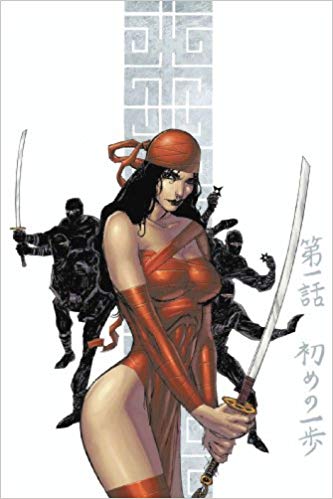Comic Book Review: Elektra: The Hand written by C.B. Cebulski, pencils by Christian Gossett, inks by Jonathan Glapion
When Elektra Natchios joined the ninja organization known as the Hand, it was with the purpose of training in the martial arts and learning killing techniques so that she would never be helpless again. She accepted, at least at the time, that this meant becoming the tool of the Hand and concentrated on the how of her training, without seeking to learn what the Hand actually was or where it had come from. After all, as a woman and a foreigner, why would they tell her such secrets? But now the Hand wants her to know.

Elektra was created by Frank Miller for Daredevil #168 as an old college girlfriend who’d gone away after young Matt Murdock failed to save her father from terrorists. Miller was a fan of manga such as Lone Wolf and Cub and modeled the character as a westernized version of fictional ninja assassins. This was followed up in Daredevil #174 with the introduction of the Hand, the organization that trained her, and also had a previously undisclosed connection with Daredevil’s own martial arts instructor Stick.
The authorship of this miniseries is its own story. C.B. Cebulski was an American who had lived on and off in Japan and was fluent enough in the Japanese language to work as a manga translator for Central Park Media. In 2002 he was hired as an Associate Editor at Marvel Comics. To supplement that income, Cebulski did freelance writing under the pen name “Akira Yoshida.”
Impressed with this work, and not realizing that Akira Yoshida was a psuedonym, another Marvel editor (without asking to meet the writer), asked Yoshida to pitch story concepts. Cebulski agreed without revealing his true identity as this would allow him to circumvent a Marvel company rule against editors also being paid as writers. Thus “Akira Yoshida” wrote several Japanese-themed miniseries for Marvel, including Elektra: The Hand.
After Yoshida “disappeared” once Cebulski was promoted to a position where he could openly write, enough suspicion was raised that there were some pointed questions asked, but Cebulski and Marvel claimed Yoshida was a real person who people had actually met, so the matter dropped for several years. But when Cebulski was promoted to Editor-in-Chief of Marvel Comics in 2017, the old rumors resurfaced and Cebulski admitted the truth.
So, on to the story within the comic book. Elektra herself only appears for three pages at the beginning, and four at the end. The main action is the life story of Kagenobu Oshioka, starting in 1575. These were the final years of the Sengoku Warring States period, but Kagenobu cares little about who is ruling. He’s more concerned about the rising influence of foreigners in his homeland. Especially after a Portuguese merchant assaults his mother after mistaking her for a prostitute.
Kagenobu, though but a stripling, kills the foreigner, and his mother claims she was the murderer to shield him. Her bloody handprint becomes a recurring motif in his life. Kagenobu is taken in by the head of the Ishiyama school of sword training. Kagenobu excels in the martial arts.
After a couple of years of wandering to improve his skills and learn new techniques, Kagenobu is summoned back to the school after the master dies to become the new head, to the jealousy of his old rival Sasaki. They make peace for now as Kagenobu explains his plan to fight foreign influence by creating a secret society that unites warriors from all parts of Japan. Five primary Japanese islands, five fingers for a Hand.
So in 1588, the Hand is formed. At first, things go well, but different members have diverging priorities, and soon an excuse is found to take the organization in a very different and perhaps darker direction.
There’s some good action scenes, and a twisty plot. The art is decent.
However, the provenance of the story makes some of the creative choices seem a little off, appealing more to the American taste in Japanese stories than believability. And then there’s the moment where our hero learns “What? Somehow our allies have learned that the woman I’ve been training, Eliza Martinez, whose name I have not bothered to conceal, whose parentage is a matter of public record, whose foreign father often visits our location, is in fact not full-blooded Japanese? How could this happen!?”
And to be honest, most of this story is irrelevant to the Hand’s current day storylines as it’s what the organization became at the end of the story that has appeared in all other tales.
Still, if Western adaptations of Japanese action films are your cup of tea, you might well enjoy this. Check it out at your local library.

